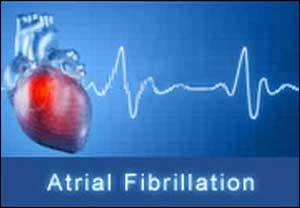- Home
- Editorial
- News
- Practice Guidelines
- Anesthesiology Guidelines
- Cancer Guidelines
- Cardiac Sciences Guidelines
- Critical Care Guidelines
- Dentistry Guidelines
- Dermatology Guidelines
- Diabetes and Endo Guidelines
- Diagnostics Guidelines
- ENT Guidelines
- Featured Practice Guidelines
- Gastroenterology Guidelines
- Geriatrics Guidelines
- Medicine Guidelines
- Nephrology Guidelines
- Neurosciences Guidelines
- Obs and Gynae Guidelines
- Ophthalmology Guidelines
- Orthopaedics Guidelines
- Paediatrics Guidelines
- Psychiatry Guidelines
- Pulmonology Guidelines
- Radiology Guidelines
- Surgery Guidelines
- Urology Guidelines
New 2019 guidelines for patients with atrial fibrillation

MINNEAPOLIS, MN - Nearly 3 million Americans are living with atrial fibrillation (AFib), which is described as quivering or irregular heartbeat (arrhythmia). With increasing lifespan and increasing prevalence of risk factors such as obesity, experts believe the number of people living with AFib will increase at an exponential rate in the next decade. This has important public implications since AFib is associated with a higher risk of stroke, heart failure, cognitive decline and dementia, and death.
Lin Yee Chen, MD, MS, Associate Professor with Tenure, Cardiovascular Division, in the Department of Medicine with the University of Minnesota Medical School was part of a Writing Committee tasked with updating the 2014 guidelines for patients with AFib. The 2019 American College of Cardiology/American Heart Association/Heart Rhythm Society Guidelines for the Management of Patients with Atrial Fibrillation were just published in Circulation, the Journal of the American College of Cardiology, and Heart Rhythm as the standard for the management of Afib in the U.S.
"These guidelines are written for all physicians in all specialties," said Chen. "It doesn't matter whether the clinician is an orthopedic surgeon, gynecologist, oncologist or brain surgeon, everyone is bound to encounter AFib in their patients because it is so prevalent."
One section of the new guidelines speaks to guiding practitioners across the whole spectrum of medicine, focusing on the use of new blood thinners or anticoagulants in people with AFib. The new guidelines help determine how and when to use these new agents, including in a situation that involves surgery.
Another portion of the document addresses the management of AFib in different scenarios, such as patients who have developed heart attacks.
"AFib patients are put on blood thinners to prevent stroke. When we need to perform procedures like a coronary angioplasty to open up any blockage in the heart arteries during a heart attack in AFib patients, we will also have to prescribe other agents called antiplatelets which when used in combination with blood thinners can elevate significantly the risk of bleeding, which is a real dilemma," said Chen. "Current research is now in favor of double therapy- one antiplatelet agent and one anticoagulant, as opposed to two antiplatelets and an anticoagulant."
A final section addresses the importance of weight-loss and weight management in improving the outcomes in people with AFib. In recent years, there is increasing evidence to suggest that lifestyle modification such as weight loss and physical activity can reduce the frequency and the burden of AFib. This has been incorporated into the new guidelines.
"The University of Minnesota could potentially make some significant contributions in the field of lifestyle modification and AFib," explained Chen. "Currently, I am the Principal Investigator of an Academic Health Center Faculty Research and Development grant which funds a randomized controlled trial aimed at evaluating different exercise protocols in reducing the burden of AFib.
"Being represented on the Writing Committee is a great honor for the University of Minnesota Medical School, because ultimately, the point of our research is to influence and impact the way we practice medicine," said Chen. "I think this is testimony to the outstanding research we perform for AFib at the University of Minnesota which is recognized by the American Heart Association and the American College of Cardiology."

Disclaimer: This site is primarily intended for healthcare professionals. Any content/information on this website does not replace the advice of medical and/or health professionals and should not be construed as medical/diagnostic advice/endorsement or prescription. Use of this site is subject to our terms of use, privacy policy, advertisement policy. © 2020 Minerva Medical Treatment Pvt Ltd